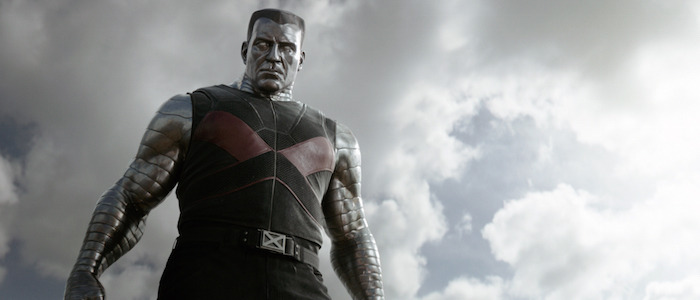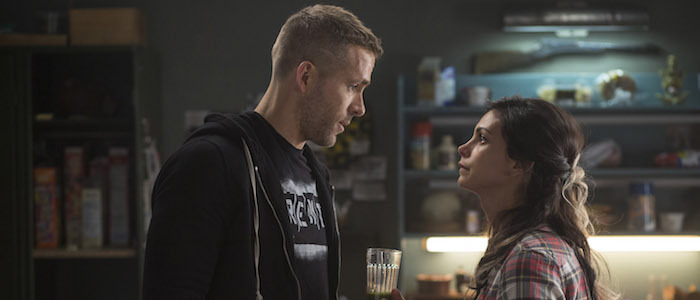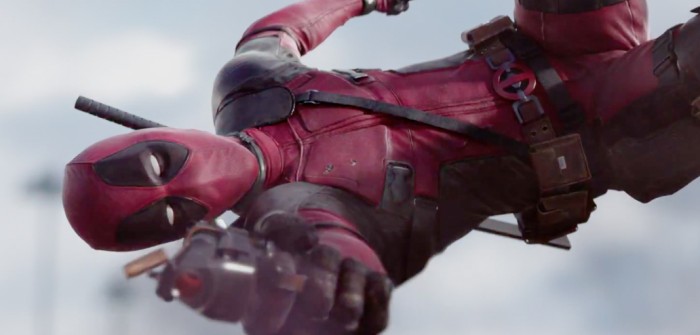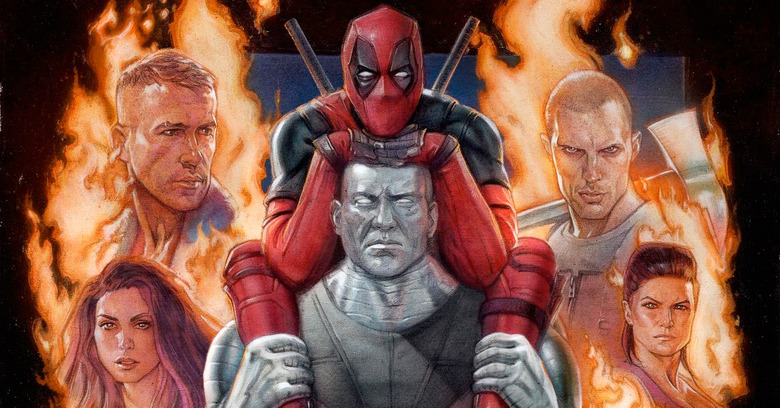The Monday Morning 'Deadpool' Review: A Spoiler-Filled Dive Into The Surprising Smash Hit
If we're going to be entirely honest with one another, I was kind of dreading Deadpool. I love superhero movies and I have often enjoyed the character of Deadpool in the pages of Marvel comic books, but I had so little faith in any attempt to bring him to the screen. I figured the film would be one joke repeated for two hours, that Wade Wilson was too weird to exist in a movie.
I was wrong and chances are strong that you also know how wrong I was, as the film opened to a record-shattering $135 million at the box office over the weekend. Deadpool is a hoot, a film that coats the typical superhero movie template with a satisfying combination of ultra-violence, immature jokes, and satire. Director Tim Miller has orchestrated a hurricane of a movie – it's a force of chaos and destruction that leaves nothing standing, but it's contained and controlled and follows a very direct and purposeful path. That's easier said than done.
And since you've all seen this movie already, it's time to take a slightly deeper dive into the movie, to break it into a few component parts and take a look at what works and what doesn't. Spoilers follow, naturally.
Ryan Reynolds
Although he has spent his entire career making it easy to root for him – he is one charismatic fellow – Ryan Reynolds has been unfortunate enough to stumble through a few too many misfires. His first stab at playing Deadpool in X-Men Origins: Wolverine remains an embarrassing low point of modern superhero cinema. It wasn't his choice to have the most talkative Marvel character of all time get his mouth sewn shut for the climax, but it's hard to forget. The same goes for Green Lantern, an aimless film made with no passion that strands him in the middle of a bunch of nonsense without a life preserver. You can actually see Reynolds struggling to stay afloat in a film that is doing everything in its power to drown him.
So Deadpool is a real "third time's the charm" situation for Reynolds, who is finally allowed to let go of any preconceived notions of being a proper leading man or a straightforward cinematic superhero. It turns out that he's a comedic force to be reckoned with you remove his boundaries. Like the movie surrounding him, Reynolds' performance as Wade Wilson is finely controlled chaos and his rat-a-tat delivery of one joke after another is as impressive as it is a little exhausting. Four days after seeing it, I'm still chuckling at him staring at his shattered wrists and his limp hands, only to mutter that all dinosaurs feared the T-Rex. It's dumb joke and a fast aside, but the fact that it's sticking with me says something.
And while much of the conversation regarding Reynolds will rightfully focus on his comic chops, his work in the film's handful of key dramatic moments still work. The sequence where he's prisoner in Ajax's laboratory is brutal stuff and Wade's gallows humor keeps these scenes from feeling entirely miserable. At the same time, Reynolds lets us see how a sense of humor can keep you alive, to keep a spark of life going even as your physical body is torn to pieces.
Deadpool may have advanced healing, but his real superpower is his unstoppable mouth – he talks and he talks because he's so broken that he needs to remind himself that he's alive. His immature dick jokes are armor. This is not a heavy film by any means, but it's easy to appreciate how Reynolds builds a proper character out of those rapid fire jokes.
The X-Men Connection
One of the more pleasantly surprisingly aspects of Deadpool is just how much of an X-Men movie it really is. Sure, the film's take on Colossus may be completely different than past versions, but you can chalk that up to the rebooted universe from the end of X-Men: Days of Future Past. What's more important are the frequent references to mutants, the use of Xavier's School For Gifted Children as an actual location, and even the presence of the X-Men's nifty jet. It may be tonally different than every X-Men movie so far, but Deadpool is no mere spin-off and it doesn't take place in its own universe – it wants to exist side by side with 20th Century Fox's other comic book movies.
And this is so satisfying. As wonderful as many of Marvel Studios' movies are, they all share a very deliberate house style. Tones may change, but you can easily watch them all next to each other and recognize them as the product of a single studio. Deadpool taking place in the X-Men universe without feeling like any other X-Men movie doesn't just lead to a surprising movie, it's a strong reflection of what it's like to actually read comics. The beauty of a Deadpool comic is that it takes place in the larger Marvel universe and can feature cameo appearances from other Marvel characters, but has a tone that is entirely its own. Superhero comics can be whatever they want to be and Deadpool is very much what it wants to be.
This is also an area where you quibble a bit. As fun as this goody-two-shows Colossus can be (and he's a terrific straight man for Deadpool's antics), I can't help but hope future versions of the character in other X-Men movies give him a bit more complexity. They've finally gotten the look right (it only took over a decade), so it would be a shame to reduce him to joke in non-Deadpool movies. The other X-Men characters are a mixed bag. Negasonic Teenage Warhead is fun (and how great is the yellow superhero suit she wears under her typical teenage wardrobe?), but she's barely a character. The villains, Ajax and Angel Dust, are painfully simplistic and their powers fairly standard, both of which would have been forgivable if the movie let them have wacky costumes or something. However, the real oddity here is how Morena Baccarin's Vanessa Carlysle has the name of the mutant superhero known as Copycat, but the movie doesn't do anything with that at all. Does this mean there was a previous draft of this film where Deadpool's girlfriend has shapeshifting powers? And if so, why did this name stay in place when those were taken away from her?
Shattering the Fourth Wall
There are too many jokes in Deadpool to count. If one gag doesn't work for you, just wait another ten seconds because the next dozen that are just around the corner may stick. Deadpool is a film constructed entirely out of attitude and that attitude is powered by non-stop jokes delivered at Airplane!-pace. Come for the superhero antics, stay for Wade Wilson's hilarious opinion on the Taken movies.
Most importantly, the film maintains Deadpool's penchant for breaking the fourth wall, for being just crazy enough (or just sane enough?) to know that he's in a comic book/comic book movie. The self-awareness begins from the very first frame, with an opening credits sequence that feels like a very deliberate riff on the heavily stylized, hugely dramatic credits that you see attached to every other comic book movie. But rather than allow the camera to swirl through digital landscapes that represent the noble and bold iconography of more traditional heroes, Deadpool features opening credits that were seemingly designed by Deadpool himself. The camera moves through an action scene on pause, lingering over all kinds of outrageous violence while the credits refuse to name names, reducing each actor and character to stock stereotype.
With an introduction like this, the film makes it very clear from the get-go that it's going to trample all over its own genre. Most of the film's comedy is immature silliness, but it's the biting takedown of typical superhero tropes that truly land. In the pages of Marvel comics, Deadpool could not have existed until he had years of comic book stories to riff on, to gleefully tear to pieces. And cinematic Deadpool could not have existed in this form a decade ago – we had to be 16 years into the age superhero movies for audiences to fully appreciate this character's specific shade of craziness. Deadpool is an assault on the familiar and there's nothing more familiar to modern audiences than comic book films.
The Central Relationship
Over the weekend, you could see the embers of controversy being stoked. You see, Deadpool is what the kids these days like to call "problematic." It takes no prisoners and it's mean and it has the maturity of a 13-year old boy. It's problematic by design. It wants to push your buttons and it wants to annoy you and irritate you and cause a ruckus when parents take their kids to a superhero movie and have to explain what the hell pegging is. Don't Google that at school or work.
I personally saw a few discussions about how Deadpool treats its female characters, with one writer I respect labeling it as a feminist work and another decrying everything about the the women in the film. My reaction to this falls somewhere in the middle – there's no way in hell I'd call this film feminist, but it certainly bears no hatred for the women in its cast. It tends to place them on equal footing with the male characters. Brianna Hildebrand's Negasonic Teenage Warhead is, like Colossus, a straight surface upon which Deadpool's gags can bounce. Gina Carano's Angel Dust is, like Ajax, a relatively dull villain who represents a physical obstacle and little more.
However, it's Morena Baccarin's Vanessa that feels like the key to this whole movie. Sure, she's been stripped of her powers and sure, she sounds nothing short of awful on paper (the damsel in distress and a hooker with a heart of gold!), but her relationship with Wade may very well be the most compelling component of the entire film. They bond over a mutual love of depraved, morbid humor. They talk about everything from Volton to Bernadette Peters. And in a superhero movie first, their relationship is explicitly sexual, with the film being entirely unafraid to actually showcase the actual lives of two adults in a committed relationship. Tony Stark and Pepper Potts might as well be chaste and saving themselves for marriage, whereas Wade and Vanessa are going to make a bunch of people Google pegging. (Please don't Google pegging if you're at work.)
Vanessa does fall victim to a few tropes. She gets to spend the middle of the movie mourning her lost boyfriend and she gets kidnapped by the bad guys so the hero has someone to save in the climax. And yet, the surprisingly naturalism and the raunchy realism of their relationship lends some weight to this set-up. Vanessa isn't just Deadpool's girlfriend – she is Wade's partner and a woman whom the movie has allowed us to love away from the confines of the actual plot. Deadpool may move fast, but it's telling that it only really slows down when these two are falling for each other and falling into a committed relationship. She may be a damsel in distress, but she's not the hero's prize – she's the woman he'd kill an army to rescue. There's a big difference.
The Action
Deadpool cost a reported $58 million before marketing, which is dirt cheap for a superhero movie. So yeah, it's obvious why the scope of the action in the film is fairly small when compared to expensive behemoths like Avengers: Age of Ultron and Man of Steel. If you ever want to know if a film's budget is on the low side, just count how many action sequences take place in junkyards and warehouses. Deadpool features both.
If there's a problem with Deadpool's action, it's that it peaks early. The opening freeway massacre is a gem, filled with clever violence and dumb jokes stylish choices from director Tim Miller that perfectly establish what kind of movie you're in for. Miller's ability to blend comedy and violence into a mixture that can best be described as "R-rated Looney Tunes" is firmly established here. Unfortunately, none of the later action quite lives up to the first act, which is a shame. The film isn't derailed by any means – Miller keeps things fast and funny and odd enough that the more generic climax isn't much of an issue. Even when the action takes a turn toward the familiar, the comedy is more than enough to provide a unique flavor. It's telling that I can barely remember a single memorable action beat from the final battle, but I do remember Deadpool taunting Ajax with the name "Francis" written out in dead bodies.
But with Deadpool lighting the box office on fire this weekend, Miller will probably have unlimited freedom to indulge in whatever kinds of crazy action he wants in the already-in-the-works sequel. And Deadpool himself will surely break the fourth wall to point out how much nicer everything looks.
The Future and X-Force
We already know that we're getting a Deadpool 2. It was announced before the film opened and that $135 million opening weekend really sealed the deal. We can already imagine what a direct sequel to this movie looks like – more of the same, just bigger and nuttier and dumber. And that's entirely fine.
The real question to ponder is what the X-Men movies will look like in a post-Deadpool landscape, especially since Ryan Reynolds has already made it clear that an X-Force movie is a priority and the Deadpool post-credits scene promises an appearance from the character of Cable in future films. And this is where I have to put on my Concerned Nerd hat. As much as I enjoyed Deadpool, I don't want an X-Force movie that feels like this. Deadpool can and should be in an X-Force film, but to make that a comedic film in the same vein as his solo film would be a mistake.
For those who don't know, the X-Force is a mutant superhero team who function like the X-Men without the need to put on a good and heroic show. They often work in the shadows. They get their hands dirty. They touch the business that the regular X-Men never would. The team's mission and line-up has changed frequently over the years, but their title has often been a place to explore the darker underbelly of the X-Men corner of the Marvel universe. That's a strong concept for a film and it would be a shame to see that team reduced to the supporting cast of Deadpool 2.
While Deadpool's first film is very much a comedy, it's easy to imagine him sliding into the cast of a more serious film. In his own movie, Deadpool is a friendly, self-aware tour guide through violent and wacky adventures. In an ensemble, he's a chattering lunatic, a wild card who doesn't shut up who is funny to us and irritating the rest of the team. Ryan Reynolds should be allowed to play Deadpool for as long as 20th Century Fox will make these movies, but I sincerely hope everyone takes a break and considers how to incorporate this character the larger X-Men universe. It would be easy to let him overpower everyone else, to become the dominant focus of every ensemble he joins. But the stronger choice, the better choice, would be to find a way to let him coexist with a line-up of other great characters.




